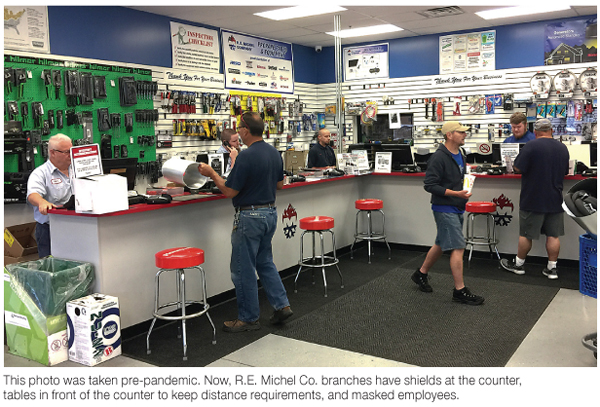Tuesday, July 28, 2020
Reacting to the changing needs of customers has never been more important than it has been in the last few months. For a company whose customers are contractors, the pandemic has brought about changes in both the products that are selling and the ways product training must be delivered. 
“Our priorities go where the customers are; we run to what people want,” says Ray Kazakewich, national LPG manager at R.E. Michel Co. (Glen Burnie, Md.), a wholesale distributor serving professional contractors. “It seems every week, we have to react to different norms—not just in business, but in everything—and that certainly translates into our business.”
For one thing, he says, there has been a shift in demand of products. “The mix of products and inventory has been a little different. We’ve had to react.”
Among the indoor products handled by professional contractors, sales of space heaters, furnaces, and water heaters are up, while luxury products are down. “It’s human nature to go to the core during times of crisis,” Kazakewich says. “People strip things down to the essentials.”
Among the outdoor products, outdoor heaters and pyrotechnic design appliances such as tiki torches are up, driven by demand from commercial customers. Speaking from Maryland in early June, Kazakewich said restaurants were only allowed to seat people outdoors or sell them meals to go. As the weather was warming up, he said, “We don’t need outdoor heating now, but we did just last week.”
Another thing that has had to change due to the pandemic is the delivery of training. R.E. Michel Co. has moved its training online. That includes both its own employee training, in which the company’s own people are updated on regulatory and technical changes, and its customer training, which includes both regulatory changes and best practices. Customer training includes two types: the company’s own direct training to customers and training in which the company’s supplier partners deliver training to its customers on its behalf.
“We used to bring training to the customer, in person, but now that has gone to Zoom training and YouTube training,” Kazakewich reports. “We release a link to customers and they can tune in at their leisure. There’s not a set time; they can do it whenever they want.
“A lot of them are getting in the habit,” he adds. “We let them know what is available, and they go through it like a menu. The customers want variety, not a cookie-cutter approach. So, our training is customized to their needs. If customers have their own policies and procedures manual, which they do, our training has to align with that.”
New training is released in advance of the season for which it is needed. As a new season approaches, bringing with it demand for different products, R.E. Michel Co. puts out the word about training, promotions, and sales around the relevant products, 30 days before the customers will want those products.
“Our training changes as the season changes; it is relevant to what our customers are talking about,” Kazakewich says. “Right now, we are shifting gears to the inside of the house. From the end of June, hearth and primary heat are what go out the door.”
The pandemic has created opportunities for companies that are prepared to deal with the unexpected, when their competitors are not.
“It has been an interesting year,” Kazakewich concluded. “We always try to be proactive, not reactive, but we’re kind of forced into reacting now because things keep changing. But we are prepared; we expect the unexpected.” — Steve Relyea

“Our priorities go where the customers are; we run to what people want,” says Ray Kazakewich, national LPG manager at R.E. Michel Co. (Glen Burnie, Md.), a wholesale distributor serving professional contractors. “It seems every week, we have to react to different norms—not just in business, but in everything—and that certainly translates into our business.”
For one thing, he says, there has been a shift in demand of products. “The mix of products and inventory has been a little different. We’ve had to react.”
Among the indoor products handled by professional contractors, sales of space heaters, furnaces, and water heaters are up, while luxury products are down. “It’s human nature to go to the core during times of crisis,” Kazakewich says. “People strip things down to the essentials.”
Among the outdoor products, outdoor heaters and pyrotechnic design appliances such as tiki torches are up, driven by demand from commercial customers. Speaking from Maryland in early June, Kazakewich said restaurants were only allowed to seat people outdoors or sell them meals to go. As the weather was warming up, he said, “We don’t need outdoor heating now, but we did just last week.”
Another thing that has had to change due to the pandemic is the delivery of training. R.E. Michel Co. has moved its training online. That includes both its own employee training, in which the company’s own people are updated on regulatory and technical changes, and its customer training, which includes both regulatory changes and best practices. Customer training includes two types: the company’s own direct training to customers and training in which the company’s supplier partners deliver training to its customers on its behalf.
“We used to bring training to the customer, in person, but now that has gone to Zoom training and YouTube training,” Kazakewich reports. “We release a link to customers and they can tune in at their leisure. There’s not a set time; they can do it whenever they want.
“A lot of them are getting in the habit,” he adds. “We let them know what is available, and they go through it like a menu. The customers want variety, not a cookie-cutter approach. So, our training is customized to their needs. If customers have their own policies and procedures manual, which they do, our training has to align with that.”
New training is released in advance of the season for which it is needed. As a new season approaches, bringing with it demand for different products, R.E. Michel Co. puts out the word about training, promotions, and sales around the relevant products, 30 days before the customers will want those products.
“Our training changes as the season changes; it is relevant to what our customers are talking about,” Kazakewich says. “Right now, we are shifting gears to the inside of the house. From the end of June, hearth and primary heat are what go out the door.”
The pandemic has created opportunities for companies that are prepared to deal with the unexpected, when their competitors are not.
“It has been an interesting year,” Kazakewich concluded. “We always try to be proactive, not reactive, but we’re kind of forced into reacting now because things keep changing. But we are prepared; we expect the unexpected.” — Steve Relyea


